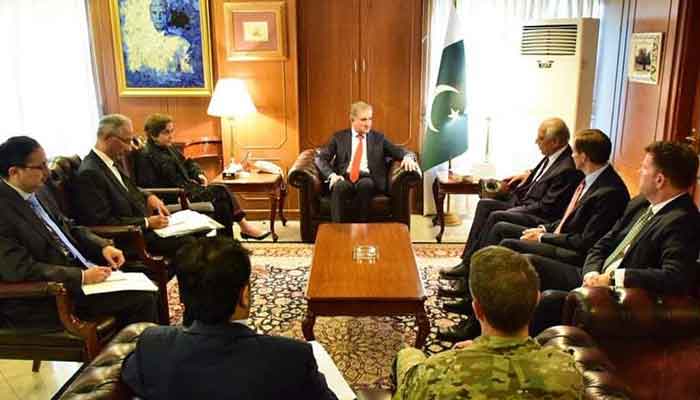Afghan conflict: Pakistan, US agree on political settlement
Also chasing a political settlement was US Special Representative for Afghan Reconciliation Zalmay Khalilzad, who on arrival in Islamabad held a delegation-level meeting at the Foreign Office in the afternoon.
ISLAMABAD: Soon after the Taliban announced that there would be no Eid truce and they would continue to fight even as Ramazan was coming to a close, Pakistan on Sunday advised caution and said it encouraged all sides to seize the moment to end the prolonged conflict through a political settlement.
Also chasing a political settlement was US Special Representative for Afghan Reconciliation Zalmay Khalilzad, who on arrival in Islamabad held a delegation-level meeting at the Foreign Office in the afternoon.
The Pakistan side was led by Additional Secretary Ambassador Aftab Khokher.
Khalilzad said he was optimistic that talks with the Taliban were moving forward and also asked for more flexibility from all sides. The Taliban say doors for further dialogue remain open but that they would not cease fighting.
“Matters of mutual interest, including the Afghan peace process, came under discussion.
“In line with the prime minister’s vision, Pakistan reiterated its commitment to peace. It encouraged all sides to seize the moment to end the prolonged conflict through political settlement,” the Foreign Office said in a Tweet but there was no press statement on the meeting.
“Khalilzad is on a two-week peace mission that will take him to Afghanistan, Belgium, Germany, Qatar and the United Arab Emirates in efforts to end the long-running Afghan war,” said the US State Department in a statement.
After his meeting at the Foreign Office, Khalilzad is also scheduled to hold meetings with the country’s civilian and military leadership to discuss the progress achieved in the Afghan peace process.
“He will work to build international support for the Afghan peace process and endeavour to ensure that any peace settlement reached will be sustainable,” added the US statement.
Khalilzad in a series of Tweets, though optimistic, expressed his disappointment that the Taliban were not ready to put down their guns even during Eid. Mullah Haibatullah Akhundzada in his end of Ramazan message pledged to continue fighting until the group's objectives were reached.
"No one should expect us to pour cold water on the heated battlefronts of Jihad or forget our 40-year sacrifices before reaching our objectives," he said in the message, adding that the Taliban aimed for "an end to the occupation and establishment of an Islamic system".
Khalilzad reacted to this statement and Tweeted, “the statement’s bombastic tone is unnecessary & only serves to complicate & disrupt as we advance peace talks. The statement suggests the US seeks violence. We do not. The level of violence in Afghanistan is unacceptable and we have no desire to perpetuate it”.
Though the Taliban still refuse to talk directly to the Afghan government and demand an immediate pull out of US troops from Afghanistan, Khalilzad is of opinion that, "We’ve made substantial progress over the last month. On this trip, I want to take that momentum and accelerate the #AfghanPeaceProcess”.
As he left Washington, Khalilzad said that after two weeks in he was back on the road.
He felt that the Taliban leader's Eid statement provided some welcome support for the #AfghanPeaceProcess and a desire to participate in dialogue with other Afghans and in a final political settlement that will require power sharing.
“All good things. At the same time, Let us find ways to work together to reduce or to immediately end violence, as we continue negotiations to end the war. The killing of the Afghans must stop. Eid Mubarak,” Khalilzad Tweeted.
-
 Extreme Cold Warning Issued As Blizzard Hits Southern Ontario Including Toronto
Extreme Cold Warning Issued As Blizzard Hits Southern Ontario Including Toronto -
 Lana Del Rey Announces New Single Co-written With Husband Jeremy Dufrene
Lana Del Rey Announces New Single Co-written With Husband Jeremy Dufrene -
 Ukraine-Russia Talks Heat Up As Zelenskyy Warns Of US Pressure Before Elections
Ukraine-Russia Talks Heat Up As Zelenskyy Warns Of US Pressure Before Elections -
 Lil Nas X Spotted Buying Used Refrigerator After Backlash Over Nude Public Meltdown
Lil Nas X Spotted Buying Used Refrigerator After Backlash Over Nude Public Meltdown -
 Caleb McLaughlin Shares His Resume For This Major Role
Caleb McLaughlin Shares His Resume For This Major Role -
 King Charles Carries With ‘dignity’ As Andrew Lets Down
King Charles Carries With ‘dignity’ As Andrew Lets Down -
 Brooklyn Beckham Covers Up More Tattoos Linked To His Family Amid Rift
Brooklyn Beckham Covers Up More Tattoos Linked To His Family Amid Rift -
 Shamed Andrew Agreed To ‘go Quietly’ If King Protects Daughters
Shamed Andrew Agreed To ‘go Quietly’ If King Protects Daughters -
 Candace Cameron Bure Says She’s Supporting Lori Loughlin After Separation From Mossimo Giannulli
Candace Cameron Bure Says She’s Supporting Lori Loughlin After Separation From Mossimo Giannulli -
 Princess Beatrice, Eugenie Are ‘not Innocent’ In Epstein Drama
Princess Beatrice, Eugenie Are ‘not Innocent’ In Epstein Drama -
 Reese Witherspoon Goes 'boss' Mode On 'Legally Blonde' Prequel
Reese Witherspoon Goes 'boss' Mode On 'Legally Blonde' Prequel -
 Chris Hemsworth And Elsa Pataky Open Up About Raising Their Three Children In Australia
Chris Hemsworth And Elsa Pataky Open Up About Raising Their Three Children In Australia -
 Record Set Straight On King Charles’ Reason For Financially Supporting Andrew And Not Harry
Record Set Straight On King Charles’ Reason For Financially Supporting Andrew And Not Harry -
 Michael Douglas Breaks Silence On Jack Nicholson's Constant Teasing
Michael Douglas Breaks Silence On Jack Nicholson's Constant Teasing -
 How Prince Edward Was ‘bullied’ By Brother Andrew Mountbatten Windsor
How Prince Edward Was ‘bullied’ By Brother Andrew Mountbatten Windsor -
 'Kryptonite' Singer Brad Arnold Loses Battle With Cancer
'Kryptonite' Singer Brad Arnold Loses Battle With Cancer




